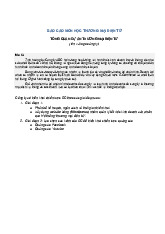


Preview text:
KMS Use Case: Pharmaceutical Company Course Title:
CS504049 – Business Intelligence (BI) Instructor: Phuc H. Duong Location: Tan Phong Campus Challenge
A pharmaceutical company has a wealth of research data, clinical trial results, and patient information
that needs to be securely stored, accessed, and shared within the organization. Solution
Implementing a Knowledge Management System (KMS) can address this challenge by:
- Centralized Knowledge Repository: Storing research papers, clinical trial protocols, patient
data, and best practices in a single, accessible location.
- Accelerated Drug Development: Enabling rapid access to relevant information, speeding up
research and development processes.
- Improved Collaboration: Facilitating knowledge sharing among researchers, scientists, and clinicians.
- Regulatory Compliance: Ensuring adherence to data privacy and security regulations by
controlling access and maintaining audit trails.
- Knowledge Preservation: Preventing loss of critical knowledge when employees leave the company.
Specific KMS Features for Pharmaceutical Companies
To effectively address the challenges faced by pharmaceutical companies, a KMS should incorporate the following features:
- Secure Document Management: Handling sensitive patient data, clinical trial results, and
intellectual property requires robust security measures, including encryption, access controls, and audit trails.
- Metadata Management: Detailed metadata should be attached to documents to facilitate search
and retrieval. This includes information about document type, author, creation date, keywords, and related projects.
- Version Control: Tracking document changes over time is crucial for regulatory compliance and ensuring data integrity.
- Collaboration Tools: Features like commenting, annotation, and real-time editing enable
efficient knowledge sharing and collaboration among teams.
- Integration with Other Systems: Seamless integration with CRM, ERP, and laboratory
information management systems (LIMS) is essential for a holistic view of the organization's knowledge.
- Analytics and Reporting: Generating insights from knowledge data can help identify trends,
optimize processes, and measure the impact of knowledge management initiatives. 1
KMS Use Cases Beyond Research and Development
While research and development is a critical area for KMS in pharmaceutical companies, its applications extend to other departments:
- Sales and Marketing: Storing product information, customer data, market research, and sales
collateral can improve sales effectiveness and customer engagement.
- Regulatory Affairs: Managing regulatory documents, guidelines, and submissions can help
ensure compliance and streamline approval processes.
- Supply Chain: Documenting supplier information, quality standards, and supply chain processes
can enhance efficiency and risk management.
- Human Resources: Storing employee training materials, performance reviews, and
organizational policies can support talent development and compliance.
Challenges and Considerations
Implementing a KMS in a pharmaceutical company can present challenges:
- Data Privacy and Security: Protecting sensitive patient data and intellectual property requires stringent security measures.
- Data Quality: Ensuring the accuracy and completeness of information is crucial for reliable decision-making.
- User Adoption: Encouraging employees to use the KMS and contribute knowledge requires
effective change management and training.
- Integration with Existing Systems: Integrating the KMS with other enterprise systems can be
complex but is essential for data consistency.
- Return on Investment (ROI): Demonstrating the value of the KMS to the organization requires
careful planning and measurement of its impact.
By addressing these challenges and leveraging the KMS's capabilities, pharmaceutical companies can
significantly improve their operations, decision-making, and overall performance.
Questions About the Use Case
1. How does the KMS ensure the privacy and security of sensitive data, such as patient information and clinical trial results?
2. What are the main challenges associated with integrating the KMS with existing systems like
CRM and ERP, and how can these be addressed?
3. What strategies can be implemented to encourage user adoption of the KMS within the pharmaceutical company?
4. How does effective metadata management contribute to the functionality of the KMS in terms of
document retrieval and knowledge sharing?
5. What metrics would be most effective for measuring the ROI of the KMS in this pharmaceutical company?
Questions to Connect to Other Real-World Use Cases
1. Healthcare Sector: How might a KMS be utilized in a hospital setting to improve patient care and hospital administration? 2
2. Manufacturing Industry: Can the features of the KMS described for the pharmaceutical
company be adapted for use in a manufacturing company to manage production processes and quality control?
3. Financial Services: In what ways could a financial services firm use a KMS to enhance
compliance with financial regulations and improve customer service?
4. Education Sector: How could educational institutions benefit from implementing a KMS to
manage and share educational resources and research effectively?
5. Technology Startups: What role could a KMS play in a tech startup focused on rapid innovation and scaling operations? --- 3




